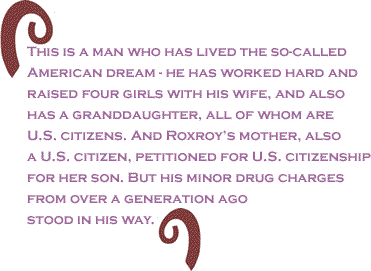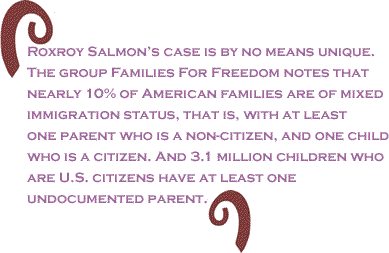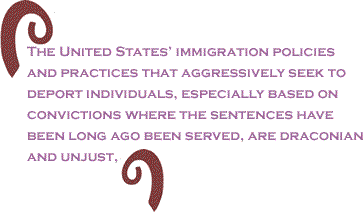
|
|||||||||||||||||||||||

|
|

Custom Search
|
|
 |
|
On July 7, 2009, Roxroy Salmon - a Jamaican immigrant, activist and Brooklyn, New York resident - appeared before an immigration judge to determine his future in this country. In a worst case scenario, Salmon, a longtime resident of the U.S. with deep roots here, was ordered deported. What is his crime, you might ask? Two decades ago, he pleaded guilty to two minor drug charges, and served no time. But that doesn’t matter under the Illegal Immigration Reform and Immigrant Responsibility Act of 1996 (IIRAIRA), an unjust federal law which allows for the mandatory deportation of immigrants for past offenses, no matter how minor the offense, or how long ago it was committed. The threat of deportation is bad enough for Salmon, 53, who came to the U.S. in 1977, undocumented, to better himself and get an education. He also has a family in America. This is a man who has lived the so-called American dream - he has worked hard and raised four girls with his wife, and also has a granddaughter, all of whom are U.S. citizens. And Roxroy’s mother, also a U.S. citizen, petitioned for U.S. citizenship for her son. But his minor drug charges from over a generation ago stood in his way. He applied for deferred action from U.S. Immigration and Customs Enforcement (ICE), in the hopes that the government will not enforce his deportation and separate him from his family. “I'm asking Congressman [Ed] Towns and Senator [Charles] Schumer to please save me and my family and other families that are in the same situation,” Mr. Salmon said as he left his hearing at 26 Federal Plaza in Manhattan. “Because we have children - here are my children - we need to stay together. Don't put me in exile!” Roxroy Salmon’s case is by no means unique. The group Families For Freedom notes that nearly 10% of American families are of mixed immigration status, that is, with at least one parent who is a non-citizen, and one child who is a citizen. And 3.1 million children who are U.S. citizens have at least one undocumented parent. In the end, 200,000 non-citizens are deported every year and separated from their families, even if the judge believes they should stay. As Human Rights Watch noted in a recent report, 72% of noncitizens who were deported had committed nonviolent offenses such as drug possession or traffic offenses. Of those legal noncitizens who were deported, 77 percent were thrown out for nonviolent offenses, meaning that only 23 percent had committed violent acts. As a result of this misguided policy of criminalizing immigration status, at least 1 million children and spouses have been separated from their family members.
Human Rights Watch concludes that U.S. deportation law fails to safeguard human rights, and “is far out of step with international human rights standards and the practices of other nations, particularly nations that it considers to be its peers” - the law lacks proportionality (after all, deportation is a severe penalty for petty infractions, including the charges to which Mr. Salmon pleaded guilty); disregards the importance of family unity (deprives one of the right to live with close family members, including minor children); fails to consider the individual’s ties to the U.S., and gives no consideration to the threat to the deportee’s life or freedom if he or she is deported to the country of origin. The report makes it plain:
Civil rights practitioners and immigrant rights advocates agree. “The United States’ immigration policies and practices that aggressively seek to deport individuals, especially based on convictions where the sentences have been long ago been served, are draconian and unjust,” says Su Ming Yeh, a staff attorney at the Pennsylvania Institutional Law Project, an organization that represents indigent prisoners and detainees whose rights have been violated. “Frequently, the ones who suffer the most are the family members and children left behind. Immigration judges should, at a minimum, be permitted discretion to consider the best interests of the children and the overall contributions of the immigrant.”
At first, in the nineteenth and early twentieth century, some European immigrant groups were viewed as inferior to Anglo-Saxons, and often competed with African Americans to the bottom of the socioeconomic ladder. In those days, it was not uncommon to see signs such as “Irish Need Not Apply” or “No Irish or Dogs Allowed” or “No Dogs, Negroes or Mexicans” for that matter. Jewish Americans faced discrimination, rigid quotas in college admissions, and in the case of Leo Frank, lynching. Then there were the laws, regulations and ordinances targeting Asian immigrants, especially Chinese and Japanese Americans. This was a manifestation of xenophobic and racist sentiment and a White fear of the “Yellow Peril”, which culminated in the internment of Japanese Americans on U.S. soil during World War II.
And today, many immigrants come from the so-called Third World, from the nations of the South, places with warm, tropical climates, and people with brown or black skin, very often Caribbean and Latin American people, and many Spanish-speaking people. The current anti-immigrant fervor - complete with anti-Latino violence and calls for building a giant fence on the U.S.-Mexico border - must be understood within the context of changing demographics and resistance to the browning of America. Throw in the color-coded war on drugs, and the implications of the war on terror, and you get the immigration mess in which we find ourselves today. For those who are threatened with deportation, there is hope on the horizon. New York Congressman José Serrano has introduced the Child Citizen Protection Act (HR182), which would allow immigration judges to consider the best interests of U.S. citizen children in deportation cases. The law would essentially allow children to be heard before their parents are taken away from them. The New Sanctuary Coalition of New York City and Families for Freedom, members of Mr. Salmon’s defense committee, support the immediate passage of HR182 by Congress. And as for Roxroy Salmon, his fate is in the hands of ICE Field Office Director Chris Shanahan, who can be reached at (212) 264-2413. BlackCommentator.com Editorial Board member David A. Love, JD is a journalist and human rights advocate based in Philadelphia, and a contributor to the The Progressive Media Project, McClatchy-Tribune News Service, In These Times and Philadelphia Independent Media Center. He blogs at davidalove.com, NewsOne, Daily Kos, and Open Salon. Click here to contact Mr. Love. |
|
Any BlackCommentator.com article may be re-printed so long as it is re-printed in its entirety and full credit given to the author and www.BlackCommentator.com. If the re-print is on the Internet we additionally request a link back to the original piece on our Website. Your comments are always welcome. eMail re-print notice
If you send us an eMail message we may publish all or part of it, unless you tell us it is not for publication. You may also request that we withhold your name. Thank you very much for your readership. |
|
| |
|
| July
9, 2009 Issue 332 |
|
| Executive Editor: Bill Fletcher, Jr. |
| Managing Editor: Nancy Littlefield |
| Publisher: Peter Gamble |
| Est. April 5, 2002 |
Printer Friendly Version
in resizeable plain
text format or pdf
format. |
| Frequently Asked Questions |
 |

|
 |
 |
 |
| |
| |





































